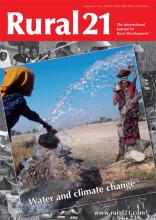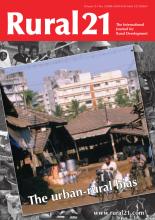Land Library
Bienvenue dans la bibliothèque du Land Portal. Explorez notre vaste collection de ressources en libre accès (plus de 74 000), comprenant des rapports, des articles scientifiques, des articles de recherche, des publications évaluées par des pairs, des documents juridiques, des vidéos et bien plus encore.
/ library resources
Showing items 244 through 252 of 317.Water is scarce in India's semiarid zones of Rajasthan. Climate change is putting additional pressure on the rare resources. Irregular or no rainfall forces many small farmers to abandon their fields, at least temporarily, and seek work in the towns.
Many adaptation measures urgently needed in agriculture today as a consequence of climate change concern water in agriculture and were already devised and implemented in the 1980s as a part of rural development activities. However, most of the experience and knowledge have sunk without trace.
The world food crisis has spurred foreign direct investments (FDI) into arable land in developing countries. While significant financial inflows into agricultural sectors could be beneficial on a global scale, it could negatively affect local livelihoods.
In Germany, the debate about the security/development nexus is gathering pace.
A team of German and Spanish scientists has genetically modified a maize plant in a way that markedly increases the level of three vitamins in the maize kernels.
The early development strategies of both China and India were urban- and industry-focused, discounting the importance of rural development. Despite sweeping reforms in both countries, the urban bias and subsequent spatial disparities still exist today.
Kenya is still largely agrarian with 80 percent of its population depending on agriculture for food, employment and income. The dilemma facing the country is that only 20 percent of the land is suited for agricultural production.
Development assistance is contingent upon the efficiency and effectiveness of delivery mechanisms. EU regional policy offers an appealing paradigm of how to achieve tangible outcomes with sound financial management
Dar es Salaam is one of the fastest growing cities in sub-Saharan Africa. In its rapidly expanding peri-urban fringe poor migrants from distant rural areas settle down on plots they can afford that provide access to urban markets.


